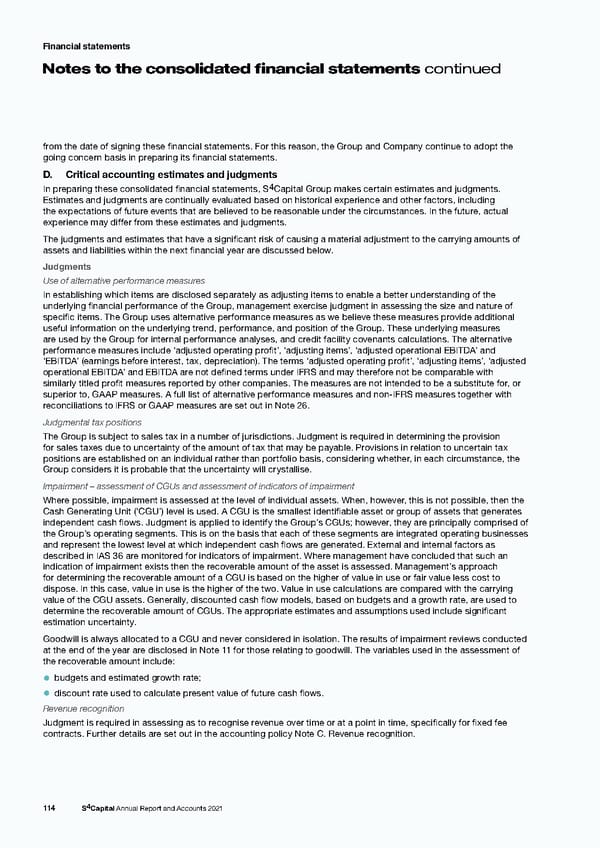Financial statements N otes to the consolidated financial statements continued from the date of signing these financial statements. For this reason, the Group and Company continue to adopt the going concern basis in preparing its financial statements. D. Critical accounting estimates and judgments In preparing these consolidated financial statements, S4Capital Group makes certain estimates and judgments. Estimates and judgments are continually evaluated based on historical experience and other factors, including the expectations of future events that are believed to be reasonable under the circumstances. In the future, actual experience may differ from these estimates and judgments. The judgments and estimates that have a significant risk of causing a material adjustment to the carrying amounts of assets and liabilities within the next financial year are discussed below. Judgments Use of alternative performance measures In establishing which items are disclosed separately as adjusting items to enable a better understanding of the underlying financial performance of the Group, management exercise judgment in assessing the size and nature of specific items. The Group uses alternative performance measures as we believe these measures provide additional useful information on the underlying trend, performance, and position of the Group. These underlying measures are used by the Group for internal performance analyses, and credit facility covenants calculations. The alternative performance measures include ‘adjusted operating profit’, ‘adjusting items’, ‘adjusted operational EBITDA’ and ‘EBITDA’ (earnings before interest, tax, depreciation). The terms ‘adjusted operating profit’, ‘adjusting items’, ‘adjusted operational EBITDA’ and EBITDA are not defined terms under IFRS and may therefore not be comparable with similarly titled profit measures reported by other companies. The measures are not intended to be a substitute for, or superior to, GAAP measures. A full list of alternative performance measures and non-IFRS measures together with reconciliations to IFRS or GAAP measures are set out in Note 26. Judgmental tax positions The Group is subject to sales tax in a number of jurisdictions. Judgment is required in determining the provision for sales taxes due to uncertainty of the amount of tax that may be payable. Provisions in relation to uncertain tax positions are established on an individual rather than portfolio basis, considering whether, in each circumstance, the Group considers it is probable that the uncertainty will crystallise. Impairment – assessment of CGUs and assessment of indicators of impairment Where possible, impairment is assessed at the level of individual assets. When, however, this is not possible, then the Cash Generating Unit (‘CGU’) level is used. A CGU is the smallest identifiable asset or group of assets that generates independent cash flows. Judgment is applied to identify the Group’s CGUs; however, they are principally comprised of the Group’s operating segments. This is on the basis that each of these segments are integrated operating businesses and represent the lowest level at which independent cash flows are generated. External and internal factors as described in IAS 36 are monitored for indicators of impairment. Where management have concluded that such an indication of impairment exists then the recoverable amount of the asset is assessed. Management’s approach for determining the recoverable amount of a CGU is based on the higher of value in use or fair value less cost to dispose. In this case, value in use is the higher of the two. Value in use calculations are compared with the carrying value of the CGU assets. Generally, discounted cash flow models, based on budgets and a growth rate, are used to determine the recoverable amount of CGUs. The appropriate estimates and assumptions used include significant estimation uncertainty. Goodwill is always allocated to a CGU and never considered in isolation. The results of impairment reviews conducted at the end of the year are disclosed in Note 11 for those relating to goodwill. The variables used in the assessment of the recoverable amount include: • budgets and estimated growth rate; • discount rate used to calculate present value of future cash flows. Revenue recognition Judgment is required in assessing as to recognise revenue over time or at a point in time, specifically for fixed fee contracts. Further details are set out in the accounting policy Note C. Revenue recognition. 114 S4Capital Annual Report and Accounts 2021
 s4 capital annual report and accounts 2021 Page 115 Page 117
s4 capital annual report and accounts 2021 Page 115 Page 117